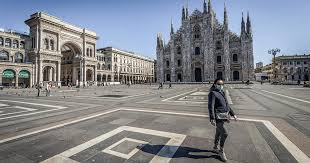Coronavirus: How to help Italy

Rome: From hospital fundraisers to paying for a family’s groceries, here are some of the ways Italians have come up with to help each other during the coronavirus outbreak.
Italy is the country by far worst hit by the coronavirus crisis in Europe, and it has seen almost one-third of all deaths from the virus worldwide.
Funding for healthcare is badly needed, as even the country’s best hospitals struggle with the sheer volume of coronavirus cases.
But while the nationwide lockdown measures imposed on March 12th seem to be helping to contain the outbreak, this has also caused serious economic problems for a country where poverty was already rife.
Millions of people in Italy are now thought to be out of work, with many left without the money for food and essentials. In poorer southern regions especially the situation is getting desperate.
Italian social security website crashes as ‘100 people per second’ apply for emergency paymentMany of our readers in Italy and beyond have asked if there’s anything they can do to help, whether through donating or volunteering. We’ve compiled a list of initiatives in the country which we hope you may find useful.
The list is not exhaustive and we’ll continue to add to it. If there’s another charity organisation or fundraising initiative that you think should be listed here, please email us and let us know.
You’ve probably heard of a caffè sospeso, ot suspended coffee, a concept thought to have originated in Naples, Italy, and adopted by coffee shops worldwide.
A customer pays for an extra coffee when buying their own at a coffee shop, the idea being that if someone who can’t afford one can ask for a ‘suspended coffee’, and it’s already been paid for.
Coffee shops across Italy are of course now closed. But the idea has been transferred to food delivery.
The new nationwide spesa sospesa (suspended shopping) initiative, from farmers’ cooperative Campagna Amica, helps support both local farmers and the many Italian families who have suddenly found themselves unable to afford groceries.
“To help fight poverty and the growing food emergency, citizens who have groceries delivered to their homes through the Campagna Amica markets can also choose to donate a food package to the most needy families, following the model of Campania’s caffè sospeso custom,” explains national agricultural association Coldiretti.
For those outside of Italy, it’s also possible to make a donation by bank transfer. “Campagna Amica will use that money to purchase quality products from its farmers, to be delivered free of charge to families in need,” writes Coldiretti.
Almost every Italian comune, or town hall, has set up a bank account for donations. Though the Italian government has sent emergency funding to municipal authorities around the country, many local mayors have said the money is nowhere near enough to help all those in need.
Local authorities across Italy are distributing food vouchers to those left with no income, as well as food parcels in cooperation with local churches and charities.
See your local comune’s website (or you may need to send them an email) to get bank account details and further information.
La Croce Rossa Italiana, The Italian Red Cross, has been playing a vital role in helping people affected by the coronavirus crisis and the shutdown in Italy, not least by delivering food parcels to vulnerable and elderly people. Find out more about their work and how you can donate to support their efforts here.
Church-run charity Caritas is also helping people across Italy who are struggling during the coronavirus outbreak.
Other efforts have focused on fundraising, particularly to support hospitals in southern Italy who are now racing against time to prepare for potential outbreaks in poorer regions.
One appeal to fund equipment for a hospital in Sicily has so far raised almost 60,000 euros.
In Naples, a similar appeal made by a 23-year-old medical student to help a hospital in Naples has raised more than €500,000 so far for medical equipment.
The fundraising appeals are not only being made in southern Italy, but across the country.
Another appeal was set up in the Tuscan city of Pisa, which was nearing the €14,000 mark.
There are numerous fundraisers for hospitals around Italy, and anyone wanting to donate can search for a campaign in their area on Gofundme or other crowdfunding websites.
Some hospitals are also launching their own official fundrasing campaigns, such as Rome’s Lazzaro Spallanzani National Institute for Infectious Diseases.





